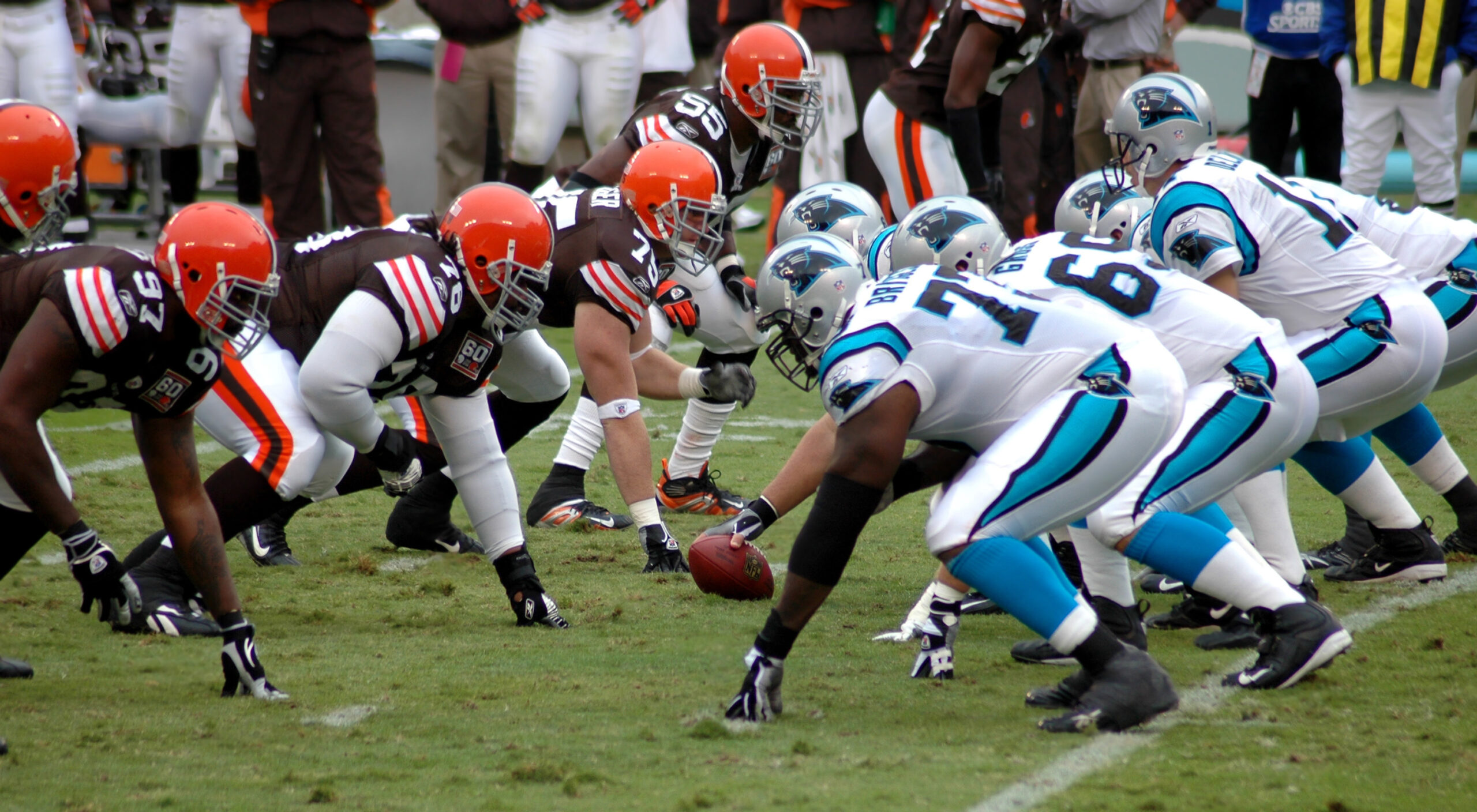Loving to Lose
There is nothing like the exquisite pains of Browns fandom.

As a sincere but not vociferous fan of the Cleveland Browns, I have become accustomed to losing records, coaching carousels, quarterback changes, and a litany of high draft picks. Yet, unlike many of my fellow Browns enthusiasts, I have come to savor their defeats.
Before real Browns fans start booing me, permit me to offer some personal history: I am a native and longtime resident of Columbus, Ohio, where the innate Midwestern appetite for gridiron sports is satiated by the ubiquitous Ohio State University Buckeyes. In the absence of an actual professional football team (officially professional, anyway), Columbus football fanatics with a hankering to watch the game on Sundays have something of a menu of options.
Within the state of Ohio, we can profess loyalty to either the Browns or the Cincinnati Bengals, but many Columbus residents look one state over to the Pittsburgh Steelers. Myself, I consider the Indianapolis Colts to be too far afield—and too far removed from rough-and-tumble outdoor football—to be a favored team among the residents of our fair city, but that didn’t stop my younger brother from being the World’s #1 Colts Fan during the reign of Peyton Manning.
So, when I began following the NFL in my 20s, I was a bit of a blank slate. In the end, I chose to root for the Browns for reasons that were probably far too rational and well-considered for something as primal as pro sports. As a history-minded chap, I admired the Browns’ great founder, Paul Brown, who, pace Al Davis, truly did foster a “commitment to excellence” embodied by such star players as quarterback Otto Graham and running back Jim Brown. As a tradition-minded conservative, I appreciated the Browns’ refusal to design or affix a logo to their iconic all-orange helmet. Besides, since my father was born and raised in Marion, Ohio, and Marion was closer to Cleveland than Cincinnati, the Mistake on the Lake had a greater claim to my heritage than the Queen City.
To my delight, the 2007 Browns campaign—the first one I watched with any devotion or consistency—was a success: Led by an unlikely mix of NFL misfits and spare parts that included quarterback Derek Anderson, kick return specialist Josh Cribbs, and running back Jamal Lewis, the Browns were competent enough, often enough, to produce a 10-6 record.
I soon learned that to be a Browns fan meant not getting too comfortable with such success.
The subsequent season was a calamity—a 4-12 campaign that culminated with the firing of head coach Romeo Crennel. But, strangely, I did not watch any less intently. To the contrary, I found that following a truly awful team was more intellectually stimulating than following a predictably brilliant team. When I watched the New England Patriots, I found myself bored: Yes, of course they were going to execute this or that amazing play, and yes, of course they were going to prevail against their outmatched opponents. Their peerlessness was monotonous.
But there was no risk of boredom in watching the Browns. Would they be hapless, bold, or lucky—who knew? Their badness meant unending upheaval and constant controversy. During the 2008 season, I monitored the incessant debate about when the struggling Anderson would give way to the inexplicable fan favorite, the former Notre Dame signal-caller Brady Quinn. Sure enough, Quinn eventually trotted onto the field, but injuries to both Quinn and Anderson meant that both third-string quarterback Ken Dorsey and late-addition quarterback Bruce Gradkowski were tapped for starts. Admit it: Isn’t it more interesting to see how unknown players deep on the roster—or, in Gradkowski’s case, barely on the roster—perform than Pro Bowl-ordained hotshots like Patrick Mahomes? In fact, Gradkowski, starting the season finale at the Steelers, produced a truly incredible stat line: 5-of-16 for eighteen yards and two interceptions.
There is fascination in desperation. Watching Tom Brady in his prime was like watching a “how-to” video in quarterbacking; watching Browns quarterback DeShone Kizer contribute to 15 Browns losses in a 16-loss season in 2017 was like watching the apocalypse.
If variety is the spice of life, Browns fans should be grateful for having plenty of it. Where but Cleveland would former Green Bay Packers head coach Mike Holmgren make a bewildering post-coaching cameo as team president? Where but Cleveland would former Saints defensive coordinator Gregg Williams, he of the “Bountygate” scandal, be anointed interim head coach? I haven’t even mentioned Johnny Manziel.
This season, when the quarterbacks Deshaun Watson and Dorian Thompson-Robinson both incurred injuries during the same game (!), third-stringer Jameis Winston suddenly found himself in the position to start a series of games—exactly the sort of unpredictable turn that followers of losing teams count on. True to the pattern, Winston’s performance was as excitingly erratic as a Trump tweet storm: He has the capacity to throw hundreds upon hundreds of yards, and dozens upon dozens of interceptions. By the standards of fans looking for painless wins, Winston’s stint has been a trial, but for those of us seeking simple diversion, it has been a treat.
This Sunday, Thompson-Robinson will start the game against the Bengals—meaning, in the pretzel-like Browns quarterback depth chart, the former second-stringer is now the first-stringer, and the former third-stringer-turned-first-stringer is now the second-stringer. To quote former vice presidential contender Tim Walz, the Browns are just “weird”—and fun to watch for it.
Perhaps the nihilistic pleasure I take in this mayhem is a reflection of the inorganic means by which I became a Browns fan—not by birthright but by choice. I would argue it reflects a deep and true fandom all the same. I love the Browns win or lose, especially lose.
The post Loving to Lose appeared first on The American Conservative.

